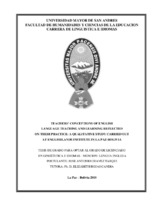Mostrar el registro sencillo del ítem
Teachers conceptions of english languaje teaching and learning reflected on their practice : a qualitative study carried out at englishlands Institute in La Paz, Bolivia
| dc.contributor.author | Chavez Tarqui, Jose Antonio | |
| dc.contributor.author | Rojas Candia, Elizabeth (Tutora) | |
| dc.date.accessioned | 2018-05-15T22:03:30Z | |
| dc.date.available | 2018-05-15T22:03:30Z | |
| dc.date.issued | 2010 | |
| dc.identifier.citation | lenguas Extranjeras. Inglés | es_ES |
| dc.identifier.uri | http://repositorio.umsa.bo/xmlui/handle/123456789/15925 | |
| dc.description.abstract | There are many factors that are involved in English language teaching and learning, be it, English as a second language or foreign language. Among the factors that influence on the successful and efficient language teaching is that of the teacher and his/her methodology. The English teacher plays a significant role in English Language Teaching (ELT) as he/she brings to the classroom context concepts, theories of language teaching, which makes up his/her “methodology.” In consequence the present research focuses on the teacher’s conceptions of ELT and on how they are reflected on practice in the classroom. In addition, the study researches the teacher’s preference to adopt a specific method (s) for the benefit of the L2 learner. The context of the study is the Englishlands institute in La Paz – Bolivia. One way of studying the relationship between the teacher’s concepts and theories of ELT reflected on practice is through observation and recording in the natural context, “the classroom.” Therefore, this study uses observation and recording to have access to teacher’s concepts and theories of ELT. On the whole, the research is based on the ethnographic research which uses the qualitative paradigm and qualitative techniques for gathering data. In brief, theory is constructed and built from data. The contents of this study are divided into five chapters. The first chapter is about the preparatory stages of the research such as the research questions, objectives and the justification of the study. The second chapter presents the theoretical foundations that support the study on teacher’s methodology, and the analysis and importance of methods. The third chapter presents the study design which deals with the analysis of data and results; and that is framed into the qualitative-ethnographic research. The fourth chapter is devoted to the interpretation of the results of data; and finally chapter five is committed to conclusions and recommendations | es_ES |
| dc.language.iso | en | es_ES |
| dc.publisher | Universidad mayor de San Andrés. Facultad de Humanidades y Ciencias de la Educación. Carrera de Lingüística e Idiomas | es_ES |
| dc.subject | INGLÉS ESTANDAR | es_ES |
| dc.subject | PROCESO DEL APRENDIZAJE | es_ES |
| dc.title | Teachers conceptions of english languaje teaching and learning reflected on their practice : a qualitative study carried out at englishlands Institute in La Paz, Bolivia | es_ES |
| dc.type | Thesis | es_ES |

